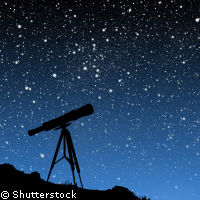International Year of Astronomy 2009: 'The Universe: yours to discover'
The 62nd General Assembly of the United Nations (UN) has officially proclaimed 2009 the International Year of Astronomy (IYA2009). Under the central theme 'The universe: yours to discover', the UN and other organisations will promote astronomical science and try to make citizens realise astronomy's impact on everyday life. 'This is an important step in furthering the interest of the public in what is arguably the oldest of all sciences: astronomy,' said Tim de Zeeuw, general director of the European Organisation for Astronomical Research in the Southern Hemisphere (ESO). 'I am very proud because ESO and its member states have been actively working together with the IAU (International Astronomical Union) and UNESCO to help achieve this result.' The year 2009 was chosen to commemorate the 400 years since scientist Galileo Galilei first pointed a telescope towards the sky, not only to discover the mountains and craters of the Moon or sunspots, but also to substantiate Copernicus' heliocentric model of the Solar System. The IYA2009 is also intended to highlight the role of international collaboration in the field, in which - according to the International Astronomical Union (IAU) - 'for several millennia, astronomers have worked together across boundaries including geographic, gender, age, culture and race, in line with the principles of the UN Charter.' 'The International Year of Astronomy 2009 gives all nations a chance to participate in this ongoing exciting scientific and technological revolution,' adds Catherine Cesarsky, president of the International Astronomical Union (IAU). Hence, the activities planned for the IYA2009 shall not be focused on developed countries alone. The IAU also wants to ensure that less well-established organisations from the developing world can become involved with larger organisations and deliver their contributions, linked via a huge global network. As part of this objective, the Universe Awareness for Young Children (UNAWE) project is hoping to fully implement its science awareness-raising scheme in the framework of the IYA2009. The UN has designated 'the United Nations Educational, Scientific and Cultural Organisation (UNESCO) as the lead agency and focal point for the year, and invites it to organise, in this capacity, activities to be realised during the year, in collaboration with other relevant entities of the United Nations system, the International Astronomical Union, the European Southern Observatory and astronomical societies and groups throughout the world.' So far, 99 nations and 14 organisations have signed up to participate in the IYA2009.



